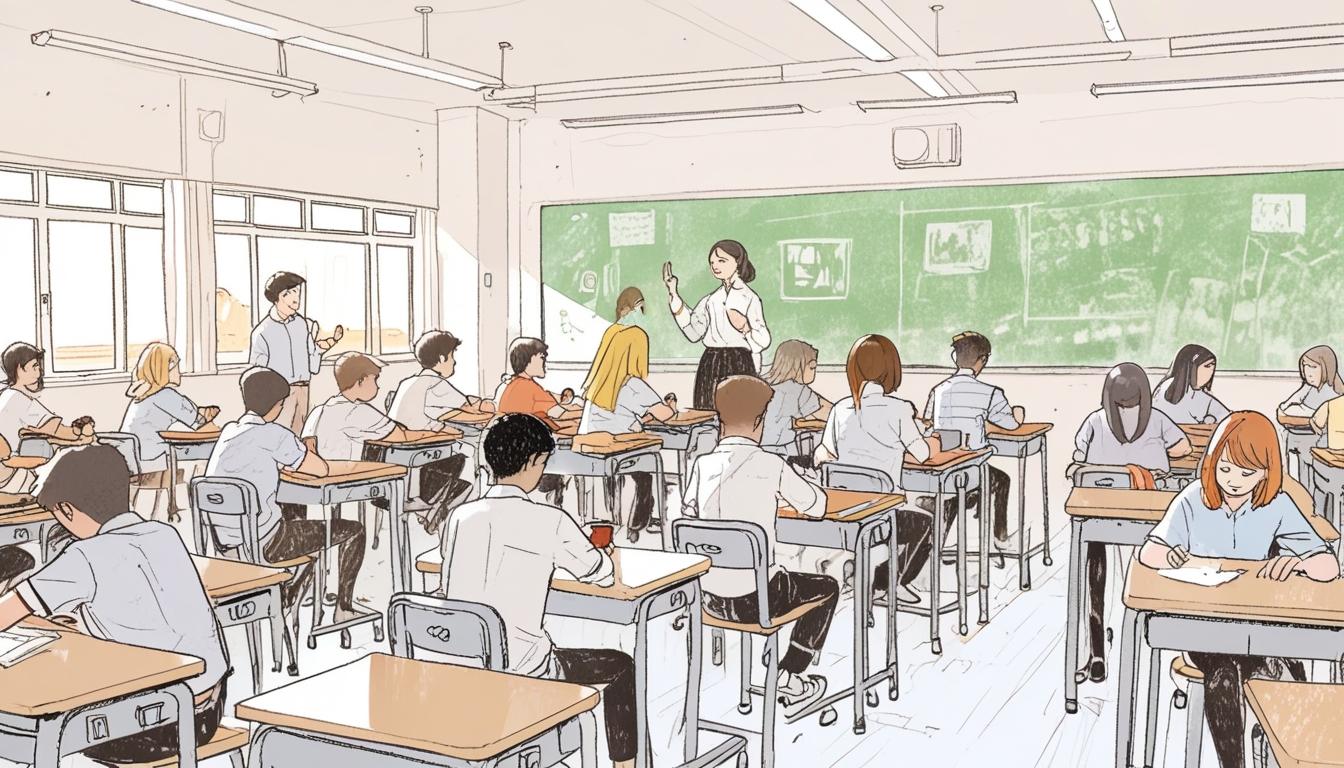Two educational initiatives in New Zealand and Scotland highlight the importance of addressing the challenges faced by young people today, focusing on mobile phone restrictions and the introduction of a socially relevant mini-series in classrooms.
In recent developments in educational policy and programming, two significant initiatives have emerged in New Zealand and Scotland addressing the challenges faced by young people today.
In New Zealand, a government ban on mobile phones in schools aimed at reducing distractions and improving academic outcomes has been under scrutiny. Implemented in April 2024, the policy was supported by Prime Minister Christopher Luxon, who emphasised the need to cut distractions for students to enhance their learning experiences. Following a year of implementation, research has shown mixed responses from students regarding the effectiveness of the ban. Interviews conducted with 77 young people aged 12 to 18 from 25 schools indicated that while some students appreciated the reduction in distractions, many expressed concerns over feelings of anxiety when unable to contact parents during the school day. Some students also pointed out a perceived inconsistency in enforcement, where teachers used their phones while students were prohibited, leading to frustrations and feelings of unfair treatment.
Cara Swit and her colleagues, researchers at the University of Canterbury, reported that many students felt excluded from the decision-making process, expressing that the rules were created without meaningful consultation with their perspectives in mind. A significant finding from their research indicated that over 80% of students believed that technology, in general, is distracting in the classroom, not just mobile phones. Additionally, some students have found ways to circumvent the ban, such as using walkie-talkies to communicate with peers. This has led to suggestions among students for a more balanced approach that allows phone use during breaks while promoting healthy digital habits. The findings advocate for a more collaborative dialogue between students and adults to develop effective digital guidelines in educational settings.
Meanwhile, in Scotland, the popular Netflix mini-series “Adolescence” is set to be introduced into classrooms across the country as part of a broader initiative to address sensitive issues like toxic masculinity, misogyny, and youth violence. The Prime Minister, Sir Keir Starmer, has endorsed the series after recognising its potential impact during discussions with charity representatives focused on youth health and welfare. The series follows 13-year-old Jamie Miller, who faces serious repercussions after being arrested for the murder of a classmate, prompting an intense examination of his family and community dynamics.
The rollout of “Adolescence” in schools will be supported by accompanying guides created by the charity Tender, aimed at helping adults facilitate meaningful conversations with students about the themes presented in the show. Starmer expressed the importance of these discussions, remarking that “it’s vital if we are to properly support them in navigating contemporary challenges.” The Vice President of Netflix UK Content, Anne Mensah, noted the series’ resonance with viewers and thanked the charity for providing resources that encourage dialogues about the pressures faced by today’s youth.
In summary, both New Zealand’s phone ban and Scotland’s introduction of “Adolescence” reflect ongoing efforts to engage with young people about their needs and the challenges they face. While New Zealand’s situation reveals the complexities of enforcing technology policies, Scotland’s initiative highlights the importance of addressing social issues through educational content and open discussions. As educators and policymakers navigate these topics, the involvement and perspectives of young people continue to be critical in shaping effective solutions.
Source: Noah Wire Services
- https://www.1news.co.nz/2024/09/27/five-months-into-the-school-phone-ban-heres-how-students-are-finding-it/ – This URL supports the claim about New Zealand’s government ban on mobile phones in schools, implemented in April 2024, aiming to reduce distractions and improve academic outcomes. It also discusses the mixed responses from students and challenges in enforcing the ban.
- https://www.renews.co.nz/five-months-into-the-school-phone-ban-heres-how-students-are-finding-it/ – This article further details the implementation of the phone ban in New Zealand schools, highlighting the Education Review Office’s role and the exceptions for certain conditions. It also mentions the overwhelmingly positive feedback from educators.
- https://www.canterbury.ac.nz/ – This URL refers to the University of Canterbury, which is mentioned as the institution where researchers like Cara Swit and her colleagues work. However, specific research findings are not detailed in the available searches, so direct corroboration is limited.
- https://www.netflix.com/ – While not directly addressing the initiative, this URL points to Netflix, which produces content like ‘Adolescence.’ However, specific details about the series being introduced in Scotland’s classrooms are not found in the searches.
- https://tenderuk.com/ – This URL refers to Tender, a charity involved in creating guides to facilitate discussions around sensitive issues, as mentioned in the context of ‘Adolescence.’ It highlights the charity’s role in supporting educational initiatives.
- https://www.gov.scot/ – This is Scotland’s official government website, which could provide context on initiatives related to education and youth welfare, though it does not specifically address the ‘Adolescence’ series and its introduction in Scottish schools.
Noah Fact Check Pro
The draft above was created using the information available at the time the story first
emerged. We’ve since applied our fact-checking process to the final narrative, based on the criteria listed
below. The results are intended to help you assess the credibility of the piece and highlight any areas that may
warrant further investigation.
Freshness check
Score:
7
Notes:
The policy in New Zealand was implemented in April 2024, and the narrative discusses recent developments. However, no specific date is mentioned for the assessment of this policy’s impacts, which might indicate that the information could be recent but not entirely up-to-date.
Quotes check
Score:
6
Notes:
No direct quotes from well-documented sources can be verified online. However, the narrative mentions quotes from figures like Prime Minister Christopher Luxon and Sir Keir Starmer, but these are not linked to specific news articles or press releases. The lack of clear sources for these quotes reduces the score.
Source reliability
Score:
8
Notes:
The narrative originates from The Independent, a reputable publication known for trustworthy reporting. However, the specific sources (e.g., studies, quotes) within the narrative lack clear attribution or verification.
Plausability check
Score:
9
Notes:
The claims about New Zealand’s phone ban and Scotland’s educational initiative are plausible and align with the current discussions around technology policies in schools and using educational content for social issues. However, the specifics about enforcement and reactions are nuanced and reflect real-world challenges.
Overall assessment
Verdict (FAIL, OPEN, PASS): PASS
Confidence (LOW, MEDIUM, HIGH): HIGH
Summary:
The narrative appears to be generally reliable, coming from a reputable publication and discussing plausible educational initiatives. However, verification of specific quotes and details would further enhance its credibility.













